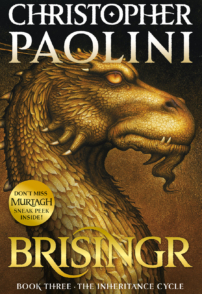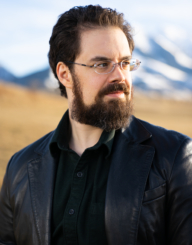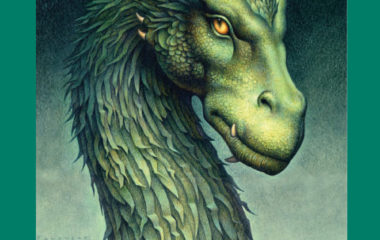It was just after dawn, and Eragon was sitting on his cot, oiling his mail hauberk, when he sensed the turbulent thoughts of a man fast approaching his tent. Eragon paused and listened, alert for trouble. A moment later, the rhythmic thud of boots striking the ground became audible. Then loud, angry shouts shattered the morning as the elves intercepted the runner. Eragon frowned when the shouts did not subside and were occasionally drowned out by the elves calling to each other in the ancient language.
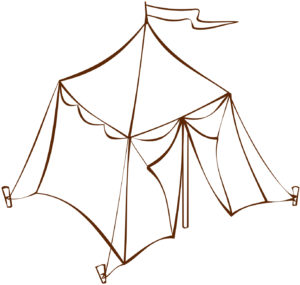 Eragon, I think you should be here, said Saphira.
Eragon, I think you should be here, said Saphira.
Grabbing his hunting knife, he stuck it through his belt and hurried out of the tent. I need a sword.
Then get one.
Two elves were holding the arms of a thrashing man, while a third elf, Blödhgarm, stalked back and forth, remonstrating with the man to calm himself. The man was neither young nor old; Eragon judged him to be about thirty. His clothes were rough, his brigandine scarred from battle, and he had a stained bandage wrapped round the upper part of his left arm. His russet beard was cropped close, and his hair was tied in a long ponytail such as Eragon had seen was common among the archers from Petrøvya. And when he shouted, his voice carried the accent of one born and raised in the south of Alagaësia.
“I have to speak with Eragon Shadeslayer!” he bellowed, cords bulging in his neck. “Let me go, you fiends! Curse you! Let me go! I have to talk with him! If I don’t, she will die! Let . . . me . . . go!” Despite his titanic struggles, he failed to budge either the silver-haired elf maid to his left or the black-haired male elf to his right.
“Compose yourself. I am here,” said Eragon as he walked forward. “What would you have of me?”
The man ceased fighting the elves and, with a stricken look, bowed as low as he could within their grip. “Please, My Lord—”
“I am no lord,” Eragon said.
For a moment, the man faltered, but then he said, “Please, Shadeslayer. I am Gull, son of Ware. I called to you yesterday, when you walked through the camp, but you did not hear my plea.”
“Perhaps I did not. What of it?”
Anguish contorted Gull’s face. “My wife, sir, Signa, she has a growth in her belly that is killing her. I have come to ask you, to beg you, to do what you can for her. We are poor, but everything we have is yours if you can but help her.”
Eragon considered, then said, “Have you taken her to see the healers of the Varden? They can cure most ailments.”
“Yes, yes! We had to wait over two months before they would examine her. They are so busy tending to the wounded, they have little time for those whose complaints are less urgent. But this growth is killing her just as surely as an arrow to the stomach.”
“What did the healers say?”
“They said they could not help her. They said the growth had spread too far, that it was in her blood. They cast a spell to lessen the pain and gave us some herbs they claimed would ease her passage into the halls of Angvard, but other than that, nothing.” Gull spoke with the bitter anger that helplessness spawns. Then his tone shifted, becoming desperate again. “Please, she hasn’t eaten for over three days. She will die soon unless something is done. . . . She needs a miracle. You are the only one who might be able to save her now. You are a Rider; nothing is beyond you. . . . Please, Shadeslayer.”
Eragon studied the knobs on his knuckles. “Death is inevitable for humans, if not now, then later. You cannot avoid losing your wife forever, nor she you. That is how the world works, and no amount of tears will change it.”
“No, but every moment is doubly precious because of it,” exclaimed Gull, his eyes fever bright. “I would not give up Signa any sooner than I have to. When she dies, half the world will die for me. Please, Shadeslayer. . . .”
Eragon gestured at the two elves that held Gull, and they released him. “Lead the way. I promise nothing, except that if it is within my power to remove this growth, I will.”
The man bobbed his head, his ponytail swinging beside his cheek. “Shadeslayer.”
As Eragon walked through the camp, following Gull, the elves silently flitted among the tents at distances of ten and twenty yards. Saphira chose to fly, and, as she wheeled against the blue backdrop of the sky, she said, There have been other petitioners who have come to seek an audience with you, but Blödhgarm and his spellcasters turned them away before they could disturb you.
Is that so? He frowned as he skirted piles of droppings left by a team of oxen. Perhaps I should emulate Nasuada.
How so?
On the sixth day of every week, from morning until noon, anyone may go to her, and she will listen to their requests and grievances, and she will fulfill or resolve them to the best of her ability. I could do likewise. Though I don’t have an infinite amount of time to devote to everyone’s troubles, my duty is to the people. If they know that there is a regular time and place where they can meet with me, then maybe they will leave me in peace during the rest of the week.
I like the idea, said Saphira. Only, you will have to be careful that you do not allow people’s requests to consume too much of your energy. We must be ready to fight at a moment’s notice.
The tent Gull brought them to was made of brown canvas, which meant it belonged to Gull and had not been issued to him by the Varden or by King Orrin. Gull entered, and Eragon pursued, motioning to the elves that they should remain outside.
Eragon stood by the entrance until his eyes adjusted to the gloomy interior. There he saw an open chest containing clothes and other belongings; a stand holding a longbow, arrows, and a spear; a scratched, three-legged stool; an iron pot that someone had knocked on its side; an empty cradle with a tiny knitted jacket draped over one end; and a bed of rushes, upon which lay the wasted figure of a woman with brown hair. Her breathing was slow and irregular.
Eragon knelt by the edge of the bed. Gull was already there, bending over his wife. He touched her shoulder and whispered, “Signa, wake up. He is here.”
Stirring, the woman turned toward Eragon. Her cheeks were hollow, the skin pale and waxy, and the bones underneath protruded farther than they should have. Purple bruises shadowed her deep eye sockets, giving her a languid, melancholy appearance. In a husky voice, she said, “Welcome, Shadeslayer. I am sorry I do not have any food or drink to offer you. I have never been so rude to a guest before. Forgive me.”
“There is nothing to forgive,” said Eragon, “for I am neither hungry nor thirsty.” And he smiled at her. She responded with a wan smile of her own. He extended a hand toward her belly, then stopped and glanced between her and Gull. “May I?”
Gull nodded, and Signa said, “Do what you must, Shadeslayer.”
As Eragon cupped her midriff, he realized that while the rest of her was starved thin, her stomach was hard and round, as if her womb contained a mound of egg-shaped stones. He could feel the lumps shift within her when he gently pressed down. It was like a malignant pregnancy, the only fruit of which would be the death of the woman so unlucky as to conceive such an obscenity. Signa gasped and arched her back at the pressure from his hand. He lifted his arm, and she relaxed.
Frowning, Eragon considered what he had learned of healing in Ellesméra. Outside, he heard Saphira land and crawl toward the tent. “Leave us, please,” he said to Gull. “I must be alone with Signa.”
Gull fidgeted with the hem of his tunic, obviously wanting to remain with his wife, then he touched his forelock and, murmuring an obeisance, he abandoned the tent.
“Can you heal me, Shadeslayer?” asked Signa.
In her voice, he discerned the flat, empty tones of despair, but also the trill of long-repressed hope reawakening. “We shall soon find out.”
“Is there anything I should do?”
“Lie back and relax. I shall attend to the rest. You may feel some odd sensations, but there should be no discomfort. Alert me if there is.”
As Eragon girded himself for his attempt, he reached out to Saphira and said, I fear this may be beyond me. The tumor has permeated her body. It has worked its way into all the secret nooks and crannies of her flesh. Eradicating it will be harder than digging out a warren of rabbit holes.
My strength is yours. Together, we cannot fail.
Closing his eyes, Eragon opened his mind to the world, which left him uncomfortably exposed, but the situation was unavoidable if he were to properly treat Signa. Pushing himself outward, he allowed his consciousness to seep through the woman’s muscles and bones, along the branching pathways of her inflamed nerves, and through the complex structures of her emaciated organs. With his inner sight, he beheld her as a creature of light: she glowed like a winter sun above a range of snow-laden peaks. When he was very still, he was able to see that her shining body was composed of count
less smaller lights. What appeared to be solid was actually a galaxy of densely packed stars, where each radiant point represented one of the many individual specks of life that made up Signa’s corporeal form. Even as he watched, thousands of the minuscule pinpricks popped in and out of existence. The brightness of a speck indicated the amount of energy it was consuming.
And in the center of the glittering galaxy was an angry red mass that throbbed with its own pulse. It was over a foot across, and from it, crimson threads extended throughout the shape of the incandescent woman. Here, Eragon knew, there was evil. The obscene lump was a miscarriage of the natural order, and as such, it deserved no mercy or consideration, for it had none itself for the person it was destroying.
Sliding between the warm substance of the shifting stars, fitting himself into the dark spaces that separated them, Eragon quickly and efficiently severed all connections to the tumor, using the word “kverst” to accomplish the cuts, and variations of the phrase “Waíse heill” to seal the resulting wounds. When the tumor floated freely in Signa’s abdomen, he sang to her flesh as he had sung to the lily he had given to Arya, coaxing it to stretch and part and flow, and thereby expel the tumor from Signa’s body. The process took many minutes, for he did not want to cause her undue distress. Throughout it, Signa lay rigid as a plank, gripping the blankets with tightly clenched fists. As the tumor approached the surface of her skin, Eragon drew his hunting knife and, still keeping his eyes closed, sliced open the middle of her dress.
Signa gasped as the tumor rose out of her stomach without breaking the skin. The tissue was hot and moist in Eragon’s hands, and also surprisingly heavy. Revolted by the boneless feel of the lump, he flipped the iron pot upright with his foot and dropped the tumor within.
“Are you done?” Signa asked. “Is it over?”
“Not yet. I have removed the bulk of the growth, but it has spawned a host of lesser growths. Now I must track each of them down and extract them as I did the parent.”
“And if you cannot?”
In the constellations of her face, he saw fear warring with helpless acceptance of her own death. Unwilling to lie, he said, “Then it will soon return, and you will be worse off than you were before.”
The light from her body dimmed, as if his admission was a breath of wind that threatened to extinguish the multitude of suns.
Determined to save her, Eragon threw himself at the task with feverish intensity, tracing the crimson threads to their inevitable ends, searching for every fragment that had broken off and taken root in the fertile soil of her flesh. For a long time he labored, and while he eliminated hundreds of fragments, thousands more eluded him. He could have cast a broader spell, one aimed at the entire population of tumors, except that the tumors were so intricately bound up in the surrounding tissue, such a spell might also attack healthy parts of Signa. Moreover, shifting a growth through Signa’s body required his close attention to ensure he caused no further harm, and whenever he excised a tumor from her body, it left a void that he then had to repair.
At last, Saphira intruded on his concentration. Eragon, you need to bring this to an end. It’s getting late; you will miss your appointment with Nasuada.
Signa’s life is worth more than my appointment, he snapped. Then he turned toward the vast collection of lights that was Saphira, her brilliance outshining that of every other creature in the camp, and spread his hands in a pleading gesture. There are just too many growths. And they keep reproducing. I could look for the whole day and still not find them all. But I want to save her. I have to save her. Only . . . He bit his tongue out of frustration.
Remember, said Saphira, you do not have to kill every soldier in order to win a war. You only have to prevent the enemy from obtaining their objective.
Eragon immediately understood what she was suggesting. Have I ever told you how wise and intelligent you are? Emanating pleased satisfaction, she hummed deep in his mind.
With renewed confidence, Eragon composed a long, intricate spell to carry out his will. Conscious as he was of the unintended consequences that a new spell could cause, he tried to imagine its every possible effect. He and Saphira went over the incantation word by word, suggesting and debating all the interpretations that occurred to them. When they were satisfied that the spell would do what it was intended to do and no more—unlike his blessing of Elva—then, and only then, did Eragon utter the lilting tones of the ancient language.
He spoke slowly, so as to avoid mispronouncing any of the foreign words, and for almost a minute, his low chant was the loudest sound in the tent. As the last of the strange, round vowels exited his mouth, he pulled himself back into the confines of his own body, like a snail retreating into its shell, and once more gazed upon the world with earthly eyes.
Signa was watching him. She lay pale and sweating, her withered frame solid and ordinary, with no sign of the burning wonder he knew it contained. The lines of pain on her face had eased somewhat, but her expression remained one of undisguised anxiety. “Will I live, Shadeslayer?” she asked.
Worn out from his exertions, Eragon did not immediately answer. Then: “It is up to Fate to decide how long you shall live, but whatever you die of, I can assure you, it won’t be this growth.”
Tears sprang into Signa’s eyes, and she pressed a hand against her throat. Twice she tried to speak, but to no avail, until she managed to croak, “Shadeslayer. Oh thank you, Shadeslayer. . . . How can I ever—”
He stopped her with a touch on her elbow. “There is a price to pay,” he said. “The growth had spread too far for me to eliminate it altogether. Therefore, I attached a spell to you that will keep the cankers from getting any larger and from infecting any other locations. However, magic requires energy to function, and that energy must come from somewhere. The spell will draw upon your strength whenever it becomes active. It won’t take much, but you may notice a persistent sense of fatigue. How severe it may be, I cannot predict.”
“A bit of tiredness is far better than being dead,” she said with a hint of a smile.
Troubled, he picked at the knobby calluses on his knuckles. “That is only part of the cost. . . . This tumor, it comes from you. It’s made from you. It’s part of you. Finding ways to describe it, then, so that the spell would only target the correct areas, wasn’t easy. I chose to do it based upon size, structure, and unusual patterns of growth. The problem is . . . Well, you see, if any part of your body suddenly changes, or if it increases too far beyond its original size, it will trigger the spell. Now, that shouldn’t interfere with the normal workings of your muscles and bones and organs. . . . I’m fairly sure it won’t. Intent is as important as wording with spells, and my intent was, well, my intent was noble. Whether that was enough to be effective, only time will tell. Understand, I am no master of the healing arts. I know how to repair many battlefield injuries, but this is the first I have treated an ailment such as yours. I have never read a spell like the one I used, nor have I ever heard of how the Riders or the elves—”
Eragon, said Saphira. Rein in your tongue; it has escaped you. Be brief. Get to the point. At this rate, you will bore the poor woman into an early grave.
Directing a guilty glance at the empty cradle at the opposite side of the tent, Eragon brought himself to heel. “Anyway, the truth is this: Your life I could give you. That much lay within my power. But I cannot promise you another life. I tried to include exceptions in the spell, but odds are, when you lie with your husband, the magic that sustains you won’t allow you to conceive a child. That . . . is the full cost. . . . I am sorry, but it was the only way I could save you.” Fearful of how she would react to such a loss, and ashamed of his part in the theft, he looked down and around, and then settled for clasping his hands with unnecessary force.
Like a marble effigy mounted upon a dry and dusty tomb was Signa. The faint throb of a vein in the hollow of her throat was the only indication that her spirit had not fled into the void. She stirred then, and her eyes softened, and she gazed at Eragon with pity. Placing a soft hand upon his cheek, she said, “If your intentions were as noble as your words, then I believe I have nothing to fear from your spell. You have a good heart, Shadeslayer. I will trust in that, and not a lawgiver’s dreary translation of your words.” Her hand lingered upon the side of his face. “You are so young,” she said. “So very young to carry the burdens of an entire land. Do not let it weigh you down too greatly, Shadeslayer.”
Then she lowered her arm, and Eragon called for Gull, who he was sure was hovering nervously outside the front of the tent. As Gull entered the cramped space, Signa covered herself where Eragon had cut open her dress, as if her modesty only mattered now that her husband could see her.
Gull hesitated by the end of the cradle, his face a picture of agony as he waited for the verdict on Signa’s future. Feeling that he was not the best messenger of the news, Eragon nodded to Signa. Half crying, half laughing, she said, “I’m cured. . . . Gull, I’m cured! It’s over. The fear is gone.”
With a strangled exclamation, the archer threw himself to his knees next to the cot and pressed his forehead against Signa’s, both of them crying in the extremity of their relief. Embarrassed by the raw display of emotions, but also pleased and satisfied with his accomplishment, Eragon dug at the ground with the tip of a boot while the couple held each other in their arms, comforting one another with kisses, caresses, and kind words. Once they had regained awareness of his presence, Eragon patiently sat through a quarter-hour of profuse thanks. Then he repeated to Gull his warning about Signa’s possible lack of energy, and he said, “In any case, you should not push yourself too hard, Signa. You were on the very brink of death. It will take many months for your health to fully recover. Until it does, avoid all unnecessary strain. Gull, you will see that she stays well-fed and well-rested.”
It was not a question, but Gull still bobbed his head and said, “I swear to you, Shadeslayer, I will care for her as tenderly as a newborn babe.”
Eragon winced inwardly. “Good. That is exactly the sort of care she needs.” He refrained from mentioning that his treatment might have left Signa barren. It was for her to decide, not him, whether her husband ought to know.
After excusing himself from their many offers of hospitality and bidding them farewell, Eragon left Gull and Signa cuddled together on the edge of the cot. On his way out of the tent, he bent and snared the handle of the iron pot that held the biggest of the tumors he had extracted. Squinting in the bright morning sunlight that streamed through the camp, he walked to where Saphira sat crouched in the intersection of two avenues wide enough to accommodate her bulk.
The pot emitted a dull clang as Eragon threw it onto the ground. It rolled several feet, and the tumor slid out onto the bare path. Flecks of dirt clung to the glistening surface of the fatty, slug-like mass. “Burn that, would you?” he said, his upper lip curved with revulsion.
Saphira’s chest swelled, then she parted her jaws no more than an inch, and a thin stream of blue flame shot from her mouth and engulfed the pot and the tumor together. Greasy smoke billowed from the tumor as it popped and shriveled and turned black.
The elves, who were standing guard some distance away, gazed at Saphira with admiration.
She maintained the shimmering blue jet until she had reduced the tumor to a pile of gray ashes, which the fire blew up into the air, like a cloud of fluttering petals. So hot was the blazing fountain that spouted from her gullet, the pot began to glow cherry-red after only a few seconds, and by the time she had finished incinerating the tumor, the pot had melted into a pool of liquid metal.
Saphira closed her jaws with a sharp click. Her neck convulsed as she swallowed, snuffing out the fire in her belly. Then she scooped three pawfuls of dirt out of the middle of the crossroads, excavating a hole six feet deep, and with the side of a curved talon, scraped the cooling but still soft iron into it. There, she said as she filled the hole back up again. Now no one will get hurt by accident. She exhaled forcefully, scattering the last of the ashes over the tents. And there. It is no more.
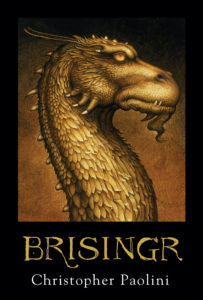 This scene, “Eragon the Healer,” from Brisingr takes place the morning after Eragon returns to the Varden from Helgrind, in the chapter “Intersecting Sagas.” It offers a unique look at Eragon’s healing abilities, as well as his responsibilities as the only free Rider in Alagaësia.
This scene, “Eragon the Healer,” from Brisingr takes place the morning after Eragon returns to the Varden from Helgrind, in the chapter “Intersecting Sagas.” It offers a unique look at Eragon’s healing abilities, as well as his responsibilities as the only free Rider in Alagaësia.
 Eragon, I think you should be here, said Saphira.
Eragon, I think you should be here, said Saphira.